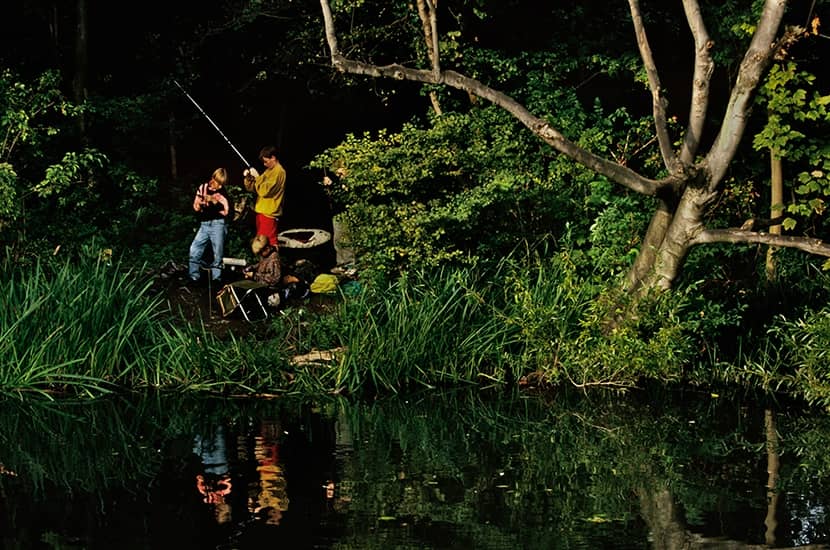To write about London and its rivers is to enter a crowded literary field. Many aspects of watery life in the capital have been documented for public consumption over the past 150 years, from Hilaire Belloc’s lament for the river’s lost monasteries in The Historic Thames to Peter Ackroyd’s doorstop, London: A Biography. More recently, it is previously unremarked everyday stories which have found a home on many publishers’ lists. The practice of mudlarking especially of sifting objects from the river’s mud has held readers in thrall. Sometimes it sounds as though the Thames foreshore at low tide must be as busy as a King’s Cross platform during a pre-pandemic rush hour.
In this latest addition to the city’s riparian canon, London Clay, the poet Tom Chivers documents a series of ‘journeys in the deep city’. He wisely makes no attempt to be comprehensive or exhaustive in his wanderings, choosing rather to cover those areas of the metropolis to which he has a personal connection. Thus, he begins on the cusp of the East End in Aldgate where he lived for many years as a young man, moves on to the Herne Hill area of south London where he grew up, and ends in his family’s current home, Bermondsey. Along the way, he makes excursions to places such as Westminster, Hampstead, the City and Stratford which have links to the subterranean features he is examining.
With mudlarking so popular, the Thames foreshore sounds as busy as pre-pandemic King’s Cross at rush hour
The lost rivers of London are a major preoccupation of this book. These are streams, such as the Fleet and the Walbrook, which have been gradually diverted and culverted over the centuries to run through sewers rather than on the surface. Armed with a Streetfinder map which he has coloured in to show the city’s different rock strata, Chivers and a rotating cast of friends walk the course of several such streams and observe their modern-day traces. Geological features such as ‘scour holes’, and former islands like the one upon which the Palace of Westminster stands, are similarly investigated.
These accounts provide periodic surprises even for the most dedicated student of this subject. For instance, I lived for many years mere yards from a mysterious subterranean south London depression known to archaeologists as ‘the Rockingham Anomaly’ with no idea of its presence. Similarly, I’m sure that few people who work in the Treasury building on Horse Guards Road are aware that it is probably a hidden branch of the Tyburn which periodically floods the deepest basements.
London Clay belongs to the subgenre of books referred to now as ‘creative non-fiction’. Writing in this space is an exercise in synthesis: rather than focusing in detail on any one aspect of the subject, the trick is to unite disparate approaches into a seamless, original whole. When it comes off, the results can feel utterly fresh the combination of hawking, grief and literary history in Helen Macdonald’s H is for Hawk comes to mind. But if the disparate elements don’t quite meld into a singular whole, the result can be clunky and patchy, neither one thing nor another.
The latter problem besets this book. It is not a work about subterranean urban exploring, and Chivers only physically descends beneath the surface once, on page 135, as part of a press trip into the new ‘super sewer’ currently under construction. Those hoping for first-hand accounts of Bazalgette’s great sewers will be disappointed. Nor is it an expert treatise on London’s geology and archaeology, or an in-depth history of the capital’s waterways, or a comprehensive walking guide to the hidden rivers. Parts of Chivers’s own story are movingly written, such as the passages about his mother, who died young of cancer when he was in his teens. But the book does not exhibit the consummate memoirist’s gift of being able to tell which memories that are interesting and precious to the writer will also resonate with the reader.
The voluminous recollection of quotidian details encountered on his walks does at times hit the mark. The description of meeting a marvellous character called John in the Elephant and Castle shopping centre is a notable highlight. Most of the time, however, it all streams past in a similar manner to a conversation overheard on the bus or an account of someone else’s dream. Similarly, the sprinkling of references to events at the time the trips were undertaken adds little. Allusions to Jeremy Corbyn and anti-Semitism, for instance, or the progress of Brexit legislation don’t link fully to the book’s overall narrative.
Chivers’s explorations continue into the summer of 2020, when lockdown restrictions mean that he could no longer meet experts in person or visit crowded indoor places. Perhaps because of these limitations, the concluding passages shine out above the rest. The birth of his second child, the struggle to keep a toddler entertained indoors and a touchingly understated outdoor reunion with his father are woven cleverly into an account of how the River Lea winds its way through the Olympic Park to the Thames. He captures something of the strangeness of living in a city crowded with people and history at a time when everyone was forced to stay apart and inside. One phrase that he uses to sign his messages during that eerie period of isolation lingers, and speaks to something of the strange solitariness of London’s underland too: ‘From our little island to yours.’





Comments